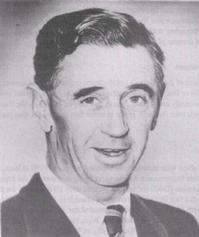


Weather News
Introduction
History
Personal Notes
Retirements
Obituaries
Obituary—Mr. L. J. Dwyer
Obituary: Mr. H. M. Treloar
James Charles Foley
Herb Whittingham Dies
Bryan Rofe
Vale Fritz Loewe
Death of H. E. Banfield
Former RD Passes On [Pat Ryan]
Arthur Muffatti Dies
David Wright
Jack Johnston
Mr E. W. Timcke
Sudden Death of Ross Maine
Ross Maine—An Appreciation
Fred Weisser
Reg Clarke
Dr Patrick Squires (1914–1990)
Bill Brann—'Architect of the Observing System'
Vale Arch Shields
Dr John Farrands
Vale David Kupsch: A Death in the Family
Observers and Volunteers
Media
Computers
Index
Search
Help
Contact us

Obituary—Mr. L. J. Dwyer
No. 71 June 1962, Item 506Mr. Dwyer's death on the morning of May 16th, after a bare four weeks absence from his office came as a profound shock to members of the Bureau and to the numerous friends he had made not only in Australia but in most countries of the world.

(born 1.12.1907; died 16.5.1962)
Director of Meteorology 1955–1962
Born on December 1st, 1907 in Geelong, Mr. Dwyer was educated at St. Kevin's Christian Brothers College and Melbourne University. He graduated a B. Sc. in mathematics and physics and some years later again took up university studies and gained the diploma of Public Administration. He had also studied accountancy and was an associate of the Australian Society of Accountants. He was an Associate of the Institute of Physics, a Fellow of the Royal Institute of Public Administration and a Fellow of the Royal Meteorological Society.
Early in his career he worked as an accountant, as a teacher and as a journalist. In 1937 he joined the Bureau and was a member of the first course in weather forecasting for science graduates.
In 1940, when it became obvious that a greatly increased training scheme must be undertaken by the Bureau to meet wartime demands for trained personnel, Mr. Dwyer took charge of the training section and planned courses of instruction for weather officers, weather observers and meteorological charters as well as writing some of the manuals for the courses. He also laid down plans and specifications for the Mobile Meteorological Flights which were later to play an important role in allied landings on Japanese-held territory.
In 1942, he was transferred to the duties of Meteorological Staff Officer, L.H.Q, South West Pacific where he served until 1946. In this post he was liaison officer for the Directorate of Meteorological Services and L.H.Q. and representative of the latter Headquarters at the Interforce meteorological conferences. In addition, he laid down specifications of data to be supplied to anti-aircraft defence officers for ballistic wind correction and participated in the work of the Chemical Defence Board.
He resumed civilian duty as Inspector (Aviation) in October 1946 and in 1947 took up the duties of Chief Clerk. In 1949 he first acted as Assistant Director (Administration) and after several periods of duty in that position, was promoted in August 1952. He first acted as Director in 1954 and was appointed to the position in March 1955.
Mr. Dwyer's assumption of office coincided with the beginning of a time of drastic reorganisation of the Bureau of Meteorology. The problems which had confronted meteorological administrators during World War II, the Korean War and their aftermaths had been surmounted but by 1954 the tremendous advances in technology, particularly in the fields of electronics and aeronautics, were having a strong impact on pure and applied meteorology, while the relatively new science of management was revolutionizing older ideas of administration.
An overseas mission in 1953 to study meteorological institutions in Europe and particularly in the United Kingdom and the United States, had given Mr. Dwyer detailed insight into the problems which he now had to face, and with his outstanding qualities of imagination, foresight and driving power, tempered by the patience for detailed negotiation where this was called for, he proved the ideal man for the position. It is no denigration of his predecessors as Commonwealth Meteorologist and Director, none of whom were confronted with these problems in anything like the same degree, to state emphatically that L. J. Dwyer was the greatest Director the Bureau of Meteorology has had.
The reorganisation of the Bureau, the first phase of which was achieved in 1958–59, was the culmination of many years of vigorous planning, preceded by the passing of the Meteorology Act of 1955 which defined in more precise terms than the original 1906 Act, the functions of the Bureau and the powers of the Director.
A list of the achievements of the Bureau under Mr. Dwyer's directorship would fill many pages. They range from the provision of many new services and warning systems to the utilisation, both in atmospheric science and in applied meteorology, of the information obtained from artificial satellites. On the management side, Mr. Dwyer was quick to realize the value to the Bureau of bringing members of its widely scattered staff together at yearly or more frequent intervals to attend seminars and conferences on such subjects as Tropical Meteorology, Forecasting, Fire Weather, Rain, Management, Services and Facilities. In addition, he organised two international symposia—those on Tropical Cyclones in Brisbane in 1956 and on Antarctic Meteorology in Melbourne in 1959—which afforded the opportunity for distinguished overseas meteorologists to visit Australia, with far reaching benefits to our organisation.
People in Bright Sparcs - Dwyer, Leonard Joseph
 |
Bureau of Meteorology |  |
© Online Edition Australian Science and Technology Heritage Centre and Bureau of Meteorology 2001
Published by Australian Science and Technology Heritage Centre, using the Web Academic Resource Publisher
http://www.austehc.unimelb.edu.au/fam/1451.html